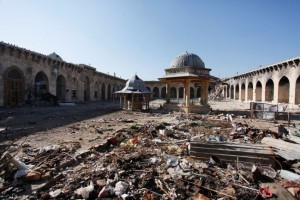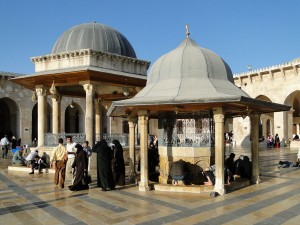In Dr. Leventhal’s talk about the destruction of cultural heritage in Syria and Iraq, he discussed mostly the devastation at the hands of ISIS and the Assad regime. These groups have jackhammered artifacts in museums, blown up mosques, and obliterated minarets important to the Syrian people. All six of Syria’s UNESCO World Heritage Sites have been affected by this kind of destruction. As I did some more research about this issue, I came across information suggesting that the Syrian opposition, known as the Free Syria Army (FSA) has also participated in the looting of historical archeological sites. As one rebel, Jihad Abu Saoud, put it, “Some days we are fighters; others we are archaeologists” (Washington Post).


The FSA is mainly transporting the looted goods to Jordan, where they sell them to antiquities dealers, who then sell them for around three times the price to locals or tourists. Of course, archeologists are dismayed by this looting. Not only is the removal and export of these artifacts illegal, it also makes it difficult, if not impossible, for these objects to be dated and studied. As Dr. Leventhal pointed out, many Syrians are very upset about the harm being done to the cultural heritage of Syria- they seen it as part of their identity being destroyed. Furthermore, the looting and destruction of these sites will harm the post-war tourism industry.

Still, I think that this issue is too complicated to simply condemn the looters without an examination of motives. I believe it is unethical for the Assad regime to destroy the cultural monuments of the opposition simply in order to hurt their morale or make a statement. I see ISIS’s intentional destruction of museum holdings in a similar light- their actions are ideologically motivated and intended to cause harm to the identity of a people, and are therefore unethical. Yet in my opinion the ethics of FSA looting in order to fund their opposition campaign is bit of a sticker issue- it requires us to weigh the fate of Syria and its people with the importance of its cultural heritage. Abu Majed, an FSA smuggler, says that, “People may judge us and call us thieves, but sometimes you have to sacrifice the past in order to secure the future” (Washington Post). Another member of the FSA defends his actions this way: “We have been left to face an entire army without arms, without money and without help from the outside world. It is within our right to use whatever resources we can find” (Ibid.). I’m not sure there is a right answer in this situation- though I do think part of the problem is the number of collectors that are willing to buy illegally obtained objects, and the number of individuals that are not informed enough to even know what they are buying and how it was acquired. In the end, I think that the destruction is devastating but that not all destruction is equally bad- the motivation and cause of the looters should be taken into account.
Further Readings:
http://www.washingtonpost.com/world/middle_east/syrian-rebels-loot-artifacts-to-raise-money-for-fight-against-assad/2013/02/12/ae0cf01e-6ede-11e2-8b8d-e0b59a1b8e2a_story.html
http://world.time.com/2012/09/12/syrias-looted-past-how-ancient-artifacts-are-being-traded-for-guns/
http://blogs.reuters.com/great-debate/2014/10/27/how-the-west-buys-conflict-antiquities-from-iraq-and-syria-and-funds-terror/
Images:
First Image and Second Images
http://en.wikipedia.org/wiki/Great_Mosque_of_Aleppo
Third Image
http://blogs.reuters.com/great-debate/2014/10/27/how-the-west-buys-conflict-antiquities-from-iraq-and-syria-and-funds-terror/
